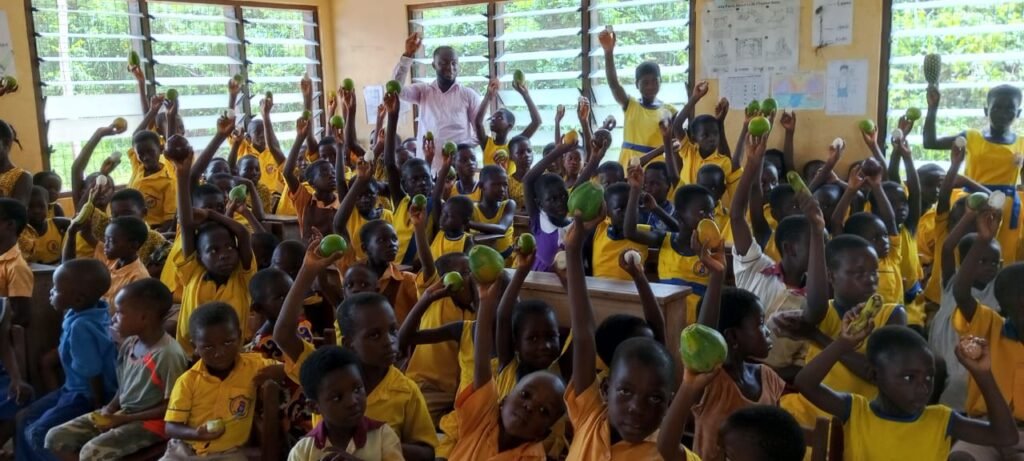
Eastern Regional Health and Education directorates have raised serious concerns over poor feeding of school children and increasing sedentary lifestyle warning of looming non-communicable disease health crises.
Already, one out of every hundred children in the region is estimated to have type I diabetes.
At a joint press conference on Wednesday April 26, 2023, by GHS and GES, the Eastern Regional Health Director Dr. Winfred Ofosu, explained, there has been decline in malnutrition among children under 5 years, however, there is significant increase in malnutrition among school children and adolescents.
Despite a steady decline in most malnutrition indicators at the national level, Ghana is confronted with the triple burden of malnutrition, overweight/obesity, and micronutrient deficiencies particularly among school children and adolescents.
Dr Winfred said “Poor dietary practices, including intake of high sugar, high fat diets, sweets, and other foods of poor nutritional value, adding, skipping of meals and physical inactivity both at school and in the home are major contributory factors to the current increasing trends of Non-Communicable Diseases (NCDs)”.
While admonishing parents and managers of schools to adopt healthy balanced lifestyle for school children, Dr Winfred Ofosu wants the school feeding program improved to meet purpose by which it was initiated. He called on communities to augment effort by government to improve quality of the meals.

Eric Sakyi, Head of Inspectorate, GES agreed to suggestions that School feeding program been given to the Ghana Education Service for its implementation to enhance effective supervision to improve quality.
Nonetheless, he stated, the Regional education directorate has initiated weekly Fruit Day observation for school children to eat fruits as supplementary nutrition.
Additionally, 130 basic schools in 26 municipalities and districts have been selected to implement Nutrition-friendly initiatives to promote healthy eating habits among students through the support of UNICEF.
The existing minimum packages for the initiative include access to Healthy and Nutritious Foods: Caterers who provide school meals develop and cook meals from a menu chart developed in line with the four-star (4****) diet.
“The menu chart should be available in the school for reference. School authorities should ensure caterers mount food on well covered tables and food is covered to prevent flies and dust from settling on it; provide clean environment for eating with adequate hand washing facilities”.
The initiative directs School Authorities to encourage parents to avoid putting fizzy drinks and sugary foods/snacks into their children’s lunch boxes.
“Schools should promote healthy eating, including consumption of fresh fruits and vegetables and iron-rich food through nutrition education. They are to institute also fruit and vegetable days (1-3 times a week) to encourage the consumption of fruits and vegetables by students. Schools are to institute protein day once every week to promote the consumption of variety of protein by students”.
Also, the project enjoins Schools to provide play spaces for physical activities.
“Schools should also ensure that physical education is taught well on class basis as indicated on the timetable. Schools should institute one-to-two-minute aerobic activities during lesson. Creating a green environment: Schools should ensure fruit trees and vegetables are planted on school compounds for beautification, wind breakers and consumption”, Dr Winfred Ofosu said.
Ghana Health Service and Ghana Education Service in collaboration with MMDAs in Eastern Region have been implementing several strategies and programs, aimed at improving nutrition and health of the adolescents.
Prominent among the strategies are “addressing Water, Sanitation and Hygiene (WASH) in schools such as construction of toilet facilities, provision of pipe-borne water and veronica buckets, menstrual Hygiene Management which includes provision of changing room for girls. The Ghana Girls Iron Folate Tablet Supplementation (GIFTS) which seeks to prevent anaemia among adolescent girls in and out of school. The annual schools deworming exercise: The GHS and the GES collaborate to provide deworming medicines to students in basic schools. This is to reduce the burden of worm infestation in the country and contribute to the reduction of anaemia among school children. The Ghana School Feeding Program is a social protection intervention initiated by the Government of Ghana which seeks to improve the nutritional status of school children and improve school enrollment”.
Source : Ghana/Starrfm.com.gh/Kojo Ansah

